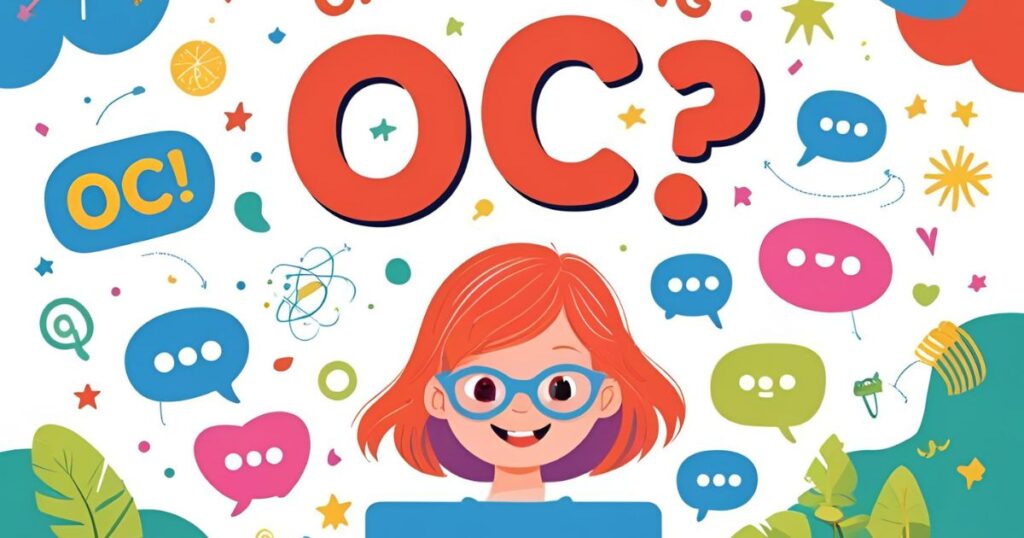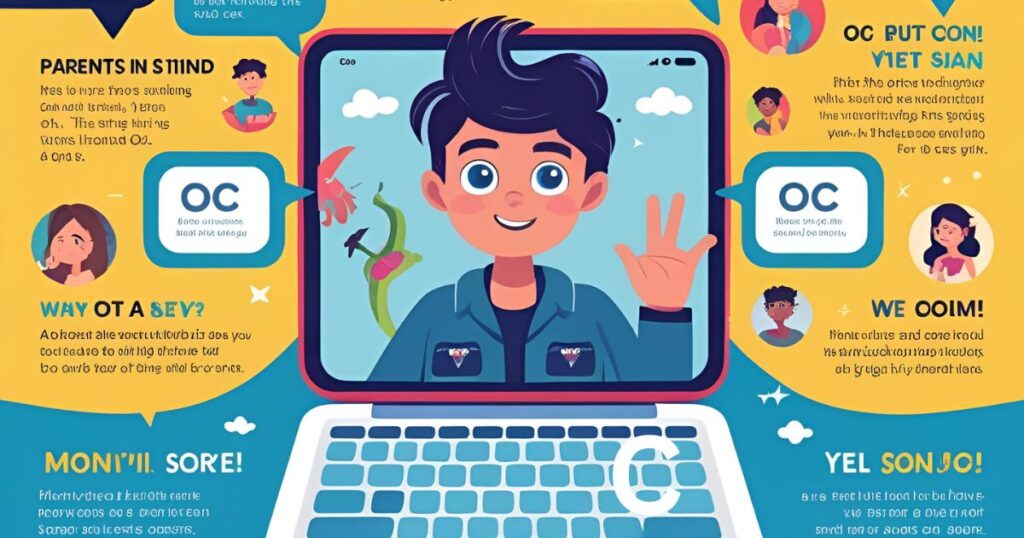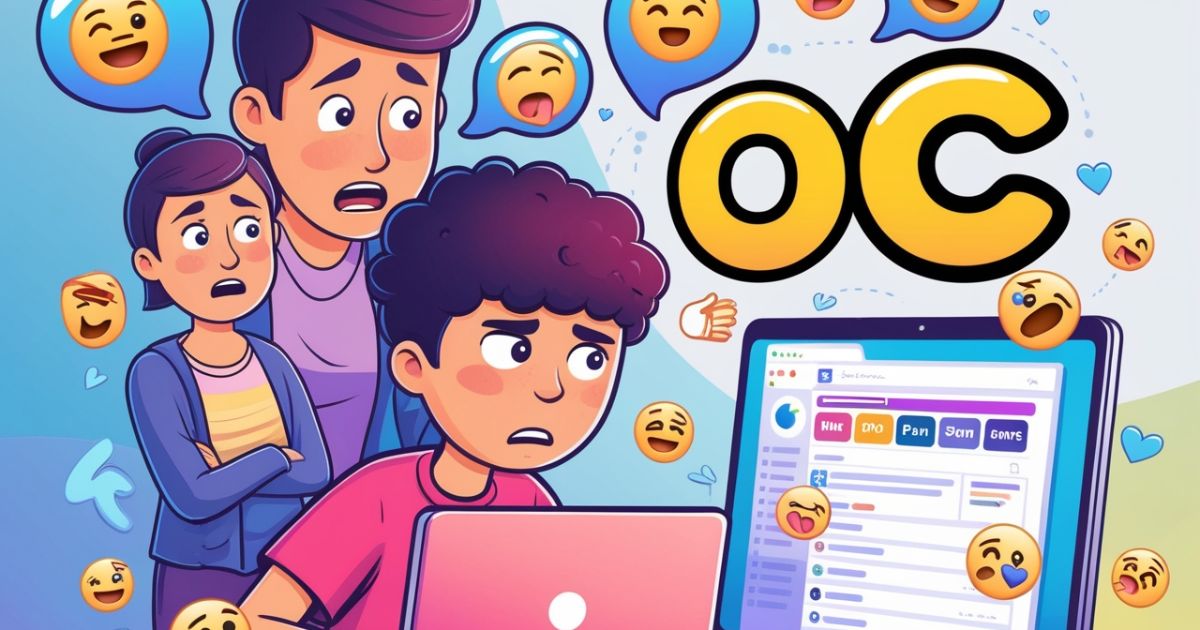Modern parenting in the digital age presents unique challenges that previous generations never faced. When your teenager mentions creating an “OC for my Fifty Shades fanfic” or discusses their latest “wizard” character in the Harry Potter universe, you might feel completely lost in translation. Understanding teen internet slang has become essential for maintaining meaningful connections with our children in today’s interconnected world.
Recent studies indicate that 95% of American teenagers use social media daily, creating their own digital languages that can leave parents feeling disconnected. Decoding your child’s online slang understanding OC terminology represents just one piece of this complex communication puzzle, yet it opens doors to deeper conversations about creativity, self-expression, and digital literacy.
The Digital Language Revolution in American Households
Teen communication and slang have evolved dramatically since the rise of social platforms and creative communities. Today’s youth navigate multiple digital spaces where online slang for parents to understand includes hundreds of acronyms, abbreviations, and contextual terms that change rapidly across different platforms.
The transformation affects more than simple vocabulary. Digital language guide for parents resources show that understanding youth communication patterns strengthens family bonds and improves overall household communication. When parents invest time in keeping up with teen lingo, they demonstrate respect for their children’s interests and create opportunities for meaningful dialogue.
Understanding youth slang also serves practical safety purposes. Parents who recognize common terms can better monitor online interactions and identify potential concerns before they escalate. This knowledge empowers families to navigate digital spaces together while maintaining appropriate boundaries and trust.
The cultural shift toward explaining teen internet terms reflects broader changes in how families communicate. Traditional parent-child dynamics now require adaptation to include digital literacy components that benefit both generations.
The Slang ‘OC’: Meaning and Significance

What does OC mean online represents one of the most important questions parents ask when encountering their child’s creative digital activities. The acronym stands for “Original Character,” a term deeply embedded in fanfiction slang terms and creative writing communities across the internet.
OC meaning in fanfiction extends beyond simple character creation. These fan-created characters serve as vehicles for young writers to explore storytelling, develop writing skills, and express personal creativity within established fictional universes. What is an original character encompasses both entirely new creations and expansions of minor characters from existing works.
The significance of OC character explained lies in its connection to adolescent development and creative expression. When teenagers create original characters for Marvel Comics storylines or develop wizards within the Harry Potter universe, they engage in complex creative processes that enhance critical thinking and storytelling abilities.
OC acronym in fandoms represents more than casual internet terminology. These characters often reflect aspects of the creator’s personality, interests, or aspirations. Understanding fanfiction character slang helps parents recognize the depth of creative investment their children make in these digital spaces.
The psychological benefits of original character fanfic creation include improved writing skills, enhanced empathy through character development, and increased confidence in creative expression. OC role in creative writing demonstrates how digital platforms provide valuable outlets for artistic development that complement traditional educational approaches.
Slang ‘OC’: Use Cases, Simplified and Explained
How teens use OC online varies significantly across different platforms and communities. Popular slang OC examples appear regularly on fanfiction websites, social media platforms, and creative sharing communities where young writers gather to discuss their work and share feedback.
OC in online communities typically manifests through several common usage patterns. Teenagers might announce “Just created a new OC for my Fifty Shades fanfic” on social platforms, sharing excitement about character development with friends who share similar interests. These conversations often include detailed descriptions of character backgrounds, relationships, and story arcs.
Fanfic writing terms for parents to recognize include references to specific media franchises that inspire original character creation. Marvel story discussions frequently feature original characters integrated into existing superhero narratives, while Game of Thrones inspired content might include entirely new houses or characters within established political structures.
The Twilight series continues generating original character content years after its initial popularity, demonstrating the lasting impact of certain franchises on creative communities. Similarly, the Harry Potter universe remains one of the most active spaces for original character development, with thousands of new characters created monthly by fans worldwide.
Internet culture and fanfiction intersect through platforms like Archive of Our Own, FanFiction.Net, and Wattpad, where original character creation represents a significant portion of published content. Understanding these contexts helps parents appreciate the scope and sophistication of their children’s creative activities.
| Platform | Primary OC Usage | Age Demographics |
|---|---|---|
| Archive of Our Own | Complex character development | 13-25 years |
| Wattpad | Beginner-friendly creation | 11-18 years |
| FanFiction.Net | Established community sharing | 12-22 years |
| Tumblr | Visual character representation | 14-24 years |
Engaging in Conversation About the ‘OC’ Slang

Talking to your child about slang requires genuine interest and careful approach to avoid seeming intrusive or dismissive. Digital conversation starters work best when they demonstrate authentic curiosity about your child’s creative interests rather than interrogation about online activities.
Encouraging creative writing in teens through OC discussions opens pathways to deeper conversations about storytelling, character development, and personal expression. Parents can ask thoughtful questions like “What inspired you to create this particular character?” or “How does your original character fit into the existing story world?”
Bonding with your child through stories becomes possible when parents show genuine appreciation for the creative work involved in original character development. Understanding your child’s fandoms requires patience and willingness to learn about media franchises that might be unfamiliar to older generations.
Questions to ask about fanfiction should focus on the creative process rather than content details that might make teenagers uncomfortable sharing. Effective approaches include inquiring about favorite character traits, challenging writing scenarios, or inspiration sources for character development.
Helping kids express creativity online involves supporting their artistic endeavors while maintaining appropriate digital safety awareness. Parents can encourage creative expression in youth culture by providing resources, discussing writing techniques, or even exploring fandoms together as family activities.
Internet lingo for family bonding extends beyond simple translation exercises. When parents demonstrate willingness to learn about their children’s interests, they create foundations for ongoing communication that adapts as digital languages continue evolving.
The key lies in approaching these conversations with genuine curiosity rather than concern or judgment. Teenagers respond positively when parents show authentic interest in their creative work and acknowledge the skill required for effective character development.
Stay Ahead with azaad Slang Alert Feature
Slang parents should know continues expanding as digital communities create new terminology daily. The azaad Slang Alert Feature provides comprehensive solutions for families seeking to maintain current awareness of teen internet slang without overwhelming busy parents with information overload.
Online safety and slang awareness intersect through real-time monitoring capabilities that identify emerging terminology before it becomes widespread. This proactive approach enables parents to engage in informed conversations about digital language trends while they remain current and relevant to teenage users.
Decoding internet acronyms becomes manageable through automated alert systems that provide context-rich explanations alongside simple definitions. The feature distinguishes between harmless creative terminology like fictional character creation references and potential safety concerns that require immediate attention.
Guide to teen internet language functionality includes customizable settings that accommodate different family structures and communication preferences. Parents can adjust alert frequency, content complexity, and age-appropriate filtering to match their specific household needs.
Teaching digital literacy through structured slang education helps families develop shared understanding of online communication patterns. The alert system supports navigating modern slang by providing conversation starter suggestions and engagement strategies for each new term introduced.
Youth digital behavior tracking capabilities enable parents to understand broader communication trends without invading individual privacy. This balanced approach respects teenage autonomy while maintaining appropriate family oversight and safety awareness.
Beyond ‘OC’: Building Digital Communication Skills

Slang literacy for parents encompasses far more than individual term definitions. Internet terms glossary resources help families develop comprehensive understanding of digital communication patterns that extend across multiple platforms and communities.
Monitoring online interactions effectively requires nuanced understanding of context, tone, and cultural significance behind various slang terms. Explaining internet culture to parents involves recognizing that digital languages serve important social functions for teenagers navigating identity development and peer relationships.
Online storytelling slang represents just one category within broader digital communication systems. Understanding OC in fandoms provides foundation knowledge that applies to numerous other creative community terms and concepts that teenagers encounter regularly.
The evolution of fandom terminology explained demonstrates how digital communities create sophisticated communication systems that serve specific functional purposes. Parents who invest time in creative writing in fandoms education gain valuable insights into their children’s social and creative development processes.
Regional variations in American digital language reflect diverse cultural influences that shape teenage communication patterns. Understanding these nuances helps parents appreciate the complexity and creativity involved in modern youth communication systems.
Conclusion and Action Steps
Decoding your child’s online slang understanding OC terminology represents an important step toward building stronger family communication in our digital age. The investment in parenting in the digital age education pays dividends through improved relationships, enhanced safety awareness, and deeper appreciation for teenage creativity and self-expression.
Understanding what is an original character opens doors to meaningful conversations about storytelling, creative development, and personal interests that might otherwise remain hidden from parent awareness. These discussions strengthen family bonds while respecting teenage autonomy and creative expression.
Teen internet slang will continue evolving as digital platforms develop and youth culture adapts to new technologies. Parents who establish foundations for ongoing learning and open communication position their families for continued success in navigating these changes together.
The journey toward understanding youth slang requires patience, genuine interest, and willingness to appreciate the creativity and sophistication behind modern teenage communication systems. When parents approach these learning opportunities with respect and curiosity, they create lasting foundations for meaningful family relationships that adapt and grow alongside technological advancement.
Take action today by initiating conversations about your child’s creative interests, exploring their favorite fandoms together, and demonstrating genuine appreciation for the artistic work involved in original character development. These small steps build toward stronger family communication and deeper mutual understanding in our increasingly connected world.

Hello, I’m Daisy Sadie, a writer at Azaadpuns. I explore the dynamic world of puns and wordplay, delivering captivating linguistic twists that will make you laugh and groan. Join me on Azaadpuns.com for the latest in clever wordplay that makes language fun again.

